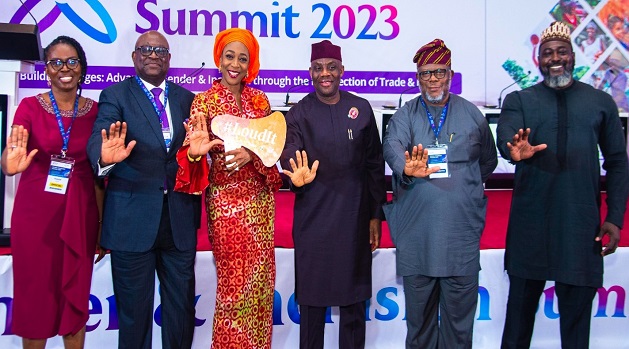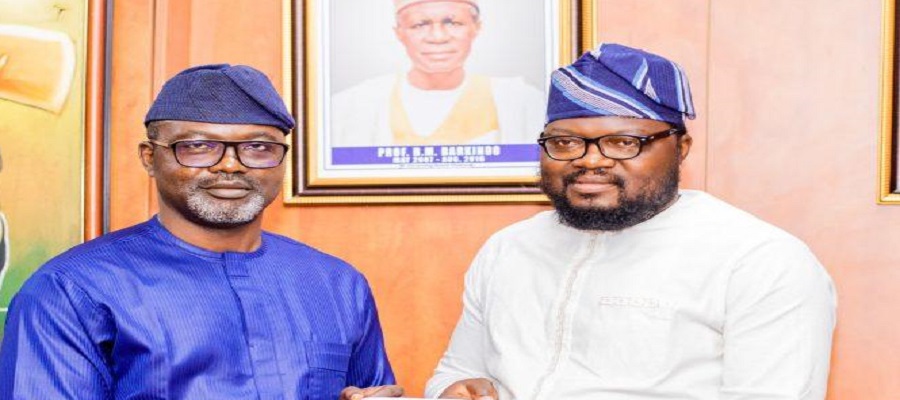News
PIC says Nigeria’s Youth Population Offers Great Potential for Innovation, Technological Advancement

Mr. Udeme Ufot, Chairman, Policy Innovation Centre (PIC) of the Nigerian Economic Summit Group (NESG) has said that the size and youthfulness of the Nigerian population offers great potential for innovation, technological advancement and economic development of the country.

Ufot stated this on Wednesday in Abuja at the Gender and Inclusion Summit 2023 convened by the Policy Innovation Centre of the Nigerian Economic Summit Group.
He noted that for this potential to be harnessed, there was need for strategic investment in health, education, infrastructural development and job creation while leveraging technology to deliver sustainable development at scale.
Commenting on the essence of the Summit, Ufot said it was “conceptualised as a platform for dialogue where critical stakeholders from diverse sectors will reflect on new evidence and contextually relevant solutions to disparities in inclusivity in Nigeria.”
He said: “The Gender and Inclusion Summit has a truly inclusive scope encompassing women, men, children, youth, people with disabilities, and other vulnerable population.
This year, we are dedicating considerable time to discuss issues relating to Nigerian youth for many reasons. Nigeria has the one of the largest population of youth in the world, about seventy percent of the population is under 35 years old.
The median age of youth in Nigeria is 18.1 years and 42% are under the age of 15.”
He commended the efforts of the current government in providing platforms for youth such as the recently launched initiative to train three million tech talents by the Ministry of Communication, Innovation and Digital Economy.
He further underscored the need for “a collective responsibility to develop inclusive approaches to address barriers to quality education, job and internship opportunities and access to health services for Nigeria’s burgeoning youth population.”
Ufot warned that Nigeria cannot afford to have “a large population of poorly educated, poorly skilled, economically unproductive and unhealthy young people.”
He therefore, tasked participants to deliberate on how to lead Nigeria to “a more inclusive nation, where all citizens have equitable access to opportunities and are positioned to realise their God given potentials in a Nigerian economy that is modern and open, private sector-led, and globally competitive.”
In his remarks, former Governor of Abia State, Dr Okezie Ikpeazu, said that following his passion for women development, that he had signed a law making it possible for women to inherit their fathers’ property and own community land.
The law, he explained, allows them to be allocated land as against the customs and tradition which made it difficult for them to own land in their communities.
He said: “Today in Abia State, female children can now inherit their fathers’ property. Now it’s an offence for female children not to be allocated land. The female children can now inherit their fathers’ property.”
Ikpeazu also recalled that he had signed a law against the discrimination of the disabled persons, which made it compulsory for all houses in Abia State to be designed with ramps to enable the disabled easy access.
The theme for the 2023 summit was “Building Bridges: Advancing Gender & Inclusion Through the Intersection of Trade & Health.”
News
LG Launches “Radio Optimism” Campaign to Spread “Life’s Good” Through Music

LG Electronics has launched a new brand campaign, “Radio Optimism,” designed to help strengthen meaningful human connections and spread optimism through shared musical experiences.

This initiative aligns with LG’s brand promise, “Life’s Good,” and addresses the growing challenge of forming genuine relationships in a technology-driven world.
The Radio Optimism campaign seeks to counteract the disconnection often felt in an era dominated by superficial interactions, such as likes and comments on social media. By harnessing the power of music, LG aims to foster deeper bonds among individuals, promoting a more fulfilling life.
“As technology advances, meaningful human connections become increasingly vital to enrich our lives. LG continues its commitment to bringing optimism into customers’ daily lives, staying true to our enduring brand promise of ‘Life’s Good,’” said Kim Hyo-eun, head of LG’s Brand Management Division.
This campaign reinforces LG’s commitment to creating enriching experiences in digital spaces where today’s consumers spend significant time. Building on this mission, LG has continuously engaged with younger audiences through participatory campaigns that bring the Life’s Good philosophy to life.
Last year’s “Optimism your feed” campaign leveraged social algorithms to foster positivity on social media. This new initiative specifically seeks to address the paradoxical disconnection in an era of hyper-connectivity.
“One of the most reliable predictors of happiness is having deep and meaningful relationships,” said Jean M. Twenge, Professor of Psychology at San Diego State University. “Yet today, many people are spending more time online and less time connecting in person. Social media in particular tends to create shallow relationships rather than the deep connections people need.
“It’s common for people to have hundreds of followers but no one to talk to in real life if they need support. We need to build more meaningful connections with those around us. That might turn around the pronounced decline in happiness that’s occurred over the last decade.”
A new global study* from LG on social connection reveals that 68 percent of people find it harder to make real friends, and a third reported having one or fewer meaningful connections in the past month, with 8 percent experiencing none at all.
Inspired by traditional radio’s unique way of connecting people through music and storytelling, the Radio Optimism campaign transforms this concept into an interactive platform where participants can create and send personalized songs to their loved ones.
Users can easily create new songs using AI-powered tools, which are thoroughly trained on a curated music dataset. These tools interpret user prompts to produce unique musical pieces and generate matching album art, providing an engaging and personalized experience. Once generated, these songs can be sent to recipients to deepen their connection and made available for others to discover worldwide.
According to the survey, nearly 9 in 10 respondents believe that meaningful connections lead to a more optimistic outlook on life. By providing a platform for individuals to express their feelings, this campaign aims to foster deeper connections and help individuals enrich their lives while spreading optimism in their own ways.
The campaign website is available in English and Spanish, with plans to support additional languages in the coming months to enable broader participation. The official website can be found at RadioOptimism.lg.com.
News
Nigeria’s Electricity Output Climbs 10.92% in Q1 2025, Boosted by Thermal Plants

Nigeria’s electricity generation rose by 10.92% in the first quarter of 2025, driven by improved operational capacity and better availability of thermal and hydropower plants supplying the national grid.

This is according to the latest report from the Nigerian Electricity Regulatory Commission (NERC) for Q1 2025.
Total energy generated stood at 10,304.47 gigawatt-hours (GWh), up from 9,289.95 GWh recorded in the previous quarter. The increase highlights stronger performance across multiple power plants, supported by improved grid dispatch conditions.
NERC noted that average hourly generation on the grid also grew by 13.39%, rising to 4,770.59 megawatt-hours per hour (MWh/h) from 4,207.41 MWh/h in Q4 2024—an increase of 563.18 MWh/h.
“The hourly generation and the total generation increased by 13.39% and 10.92% respectively in Q1 2025 compared to Q4 2024. This rise is linked to an increase in the cumulative available generation capacity of grid-connected plants,” the report stated.
A total of 19 power plants boosted their output during the quarter, contributing significantly to the overall rise in generation.
Thermal power plants were the main drivers of growth. Out of the 23 thermal plants connected to the grid, 16 recorded higher average hourly output compared to the previous quarter.
Top contributors included Delta_1, which added 157.58 MWh/h, followed by Geregu_2 (71.95 MWh/h), Egbin_1 (68.20 MWh/h), and Afam_2 (68.03 MWh/h).
Hydropower plants also supported the growth, though at a smaller scale. The five grid-connected hydro stations posted a combined increase of 54.93 MWh/h, marking a 4% improvement. Zungeru_1 led with a 23.55% rise, while Shiroro_1 and Kainji_1 grew by 12.21% and 4.80% respectively.
This first-quarter improvement reflects ongoing efforts to stabilize power supply through better plant maintenance, enhanced grid management, and more consistent dispatch across regions.
However, challenges such as fuel supply to plants, equipment reliability, and high operating costs continue to limit the full potential of Nigeria’s power generation capacity.
News
DBI, Miva Open University Partner to Advance Digital Innovation, Education

Digital Bridge Institute (DBI) and Miva Open University, Abuja, have signed a Memorandum of Understanding (MoU) to jointly promote digital technology and academic excellence in computer science and innovation.

Mr. David Daser, president/CEO, DBI, and Professor Tayo Arulogun, vice chancellor, Miva Open University.
DBI, a Federal Government-owned ICT training institute with headquarters in Abuja and campuses across Nigeria’s six geo-political zones, hosted the signing ceremony at its headquarters.
The MoU marks a significant step in formalizing and strengthening the existing relationship between the two institutions.
Signing on behalf of their institutions were
Speaking during the event, Mr. Daser praised Professor Arulogun’s leadership and commitment to academic development, which he said made the partnership possible. He emphasized that unlike many MoUs that remain inactive, this collaboration is set to deliver tangible results.
“We value this partnership and are confident it will meaningfully contribute to Nigeria’s education sector. DBI is fully prepared to implement the agreement and drive an impact across our campuses in Enugu, Abuja, Kano, Lagos, Asaba, and Yola,” Daser said.
He added that the collaboration would strengthen DBI’s National Innovation Diploma (NID) program and other initiatives through shared resources and new opportunities.
Professor Arulogun, in his remarks, highlighted the need for greater collaboration among Nigerian universities, criticizing the prevalent “do-it-alone syndrome.”
“Many institutions prefer to operate in silos, but collaboration is key. Pooling resources and working together will enhance capacity and academic output,” he stated. “With this partnership, we are ready to hit the ground running from student exchange to joint innovation projects like hackathons.”
He noted that hackathons provide platforms for discovering hidden talents and fostering innovation, and Miva is eager to integrate such activities into its academic programs.
Mr. Emeka Nzeih, head of Learning and Development, DBI, outlined the partnership’s key focus areas: student internships, real-world project collaborations, joint research in fields like AI, robotics, and cybersecurity, and shared access to DBI’s ICT labs and equipment for Miva’s students and faculty.
According to Nzeih, the initiative aims to enhance practical learning, foster innovation, and build capacity through collaborative training, research, and mentorship.

 Telecom2 days ago
Telecom2 days agoMTN Nigeria Debuts Game-Changing CPaaS Platform at NextNow Forum

 Telecom3 days ago
Telecom3 days agoNCC Approves MTN, 9Mobile Roaming Collaboration Deal

 E-Financial2 days ago
E-Financial2 days agoNAICOM Issues New Licenses to SanlamAllianz Life, General Insurance

 News2 days ago
News2 days agoAMCON Confirms ₦100Bn Sale of Ibadan DisCo Amid Legal Disputes

 E-Financial2 days ago
E-Financial2 days agoGTCO to Become First Nigerian Bank to List on London Stock Exchange

 E-Business2 days ago
E-Business2 days agoDomain of Deception as Attackers Deploy Spyware Under Guise of Legal Threats

 E-Financial3 days ago
E-Financial3 days agoWorld Bank Approves Extra $65m for Nigeria’s SPESSE

 E-Financial3 days ago
E-Financial3 days agoEcobank Taps Google Cloud to Deepen Financial Inclusion




















